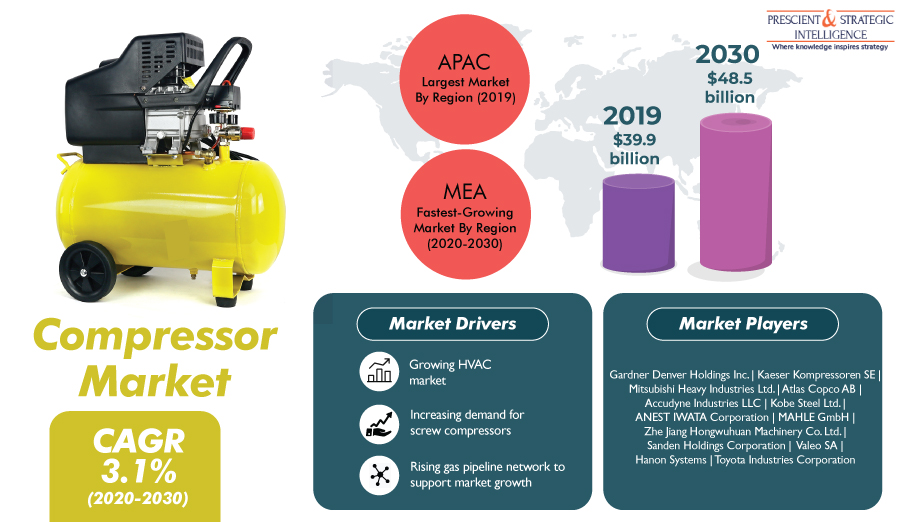The International Energy Agency (IEA) forecasts that the sale of battery electric vehicles (BEVs) (cars), fuel cell electric vehicles (FCEVs) (cars), and plug-in hybrid electric vehicles (PHEVs) (cars) will rise from 2,008,024 units in 2020 to 14,370,678 units by 2030, 9,601 units in 2020 to 293,176 units by 2030, and 969,034 units in 2020 to 7,761,233 units by 2030, respectively. The soaring electric vehicle (EV) sales, owing to the growing concerns regarding vehicular pollution, will propel the adoption of compressors in the automotive sector, as they are used in tire inflation, air conditioning systems, and painting.
Additionally, the increasing adoption of heating, ventilation, and air conditioning (HVAC) systems will drive the compressor market at a CAGR of 3.1% during the forecast period (2020–2030). According to P&S Intelligence, the market revenue will grow from $39.9 billion in 2019 to $48.5 billion in 2030. The escalating demand for HVAC systems can be owed to the large-scale construction of residential and commercial buildings, growth in the smart homes market, and rapid development of energy-efficient systems.

Geographically, the Asia-Pacific (APAC) region adopted the largest number of compressors in the recent past, and it is expected to maintain its lead in the foreseeable future. This can be primarily owed to the booming automobile industry in the region. The burgeoning demand for EVs in China and Japan owing to the rising government support toward the EV industry in the form of subsidies and tax benefits will facilitate the adoption of compressors. Moreover, the sale of conventional automobiles is also high, which is driving the demand for compressors among automakers.
Whereas, the Middle East and African (MEA) compressor market is expected to demonstrate the fastest growth in the forecast years owing to the mounting investments in the construction of production units and surging output of processed food products in the region. Nowadays, automakers are focusing on establishing their manufacturing plants in Algeria, Egypt, and Tunisia. Besides, the surging emphasis of major Gulf nations, such as Saudi Arabia, on transforming their industrial landscape is expected to boost the market growth in the MEA.
Thus, the escalating EV sales and surging demand for HVAC equipment will create a huge requirement for compressors globally.
